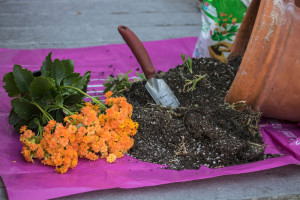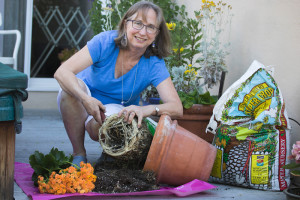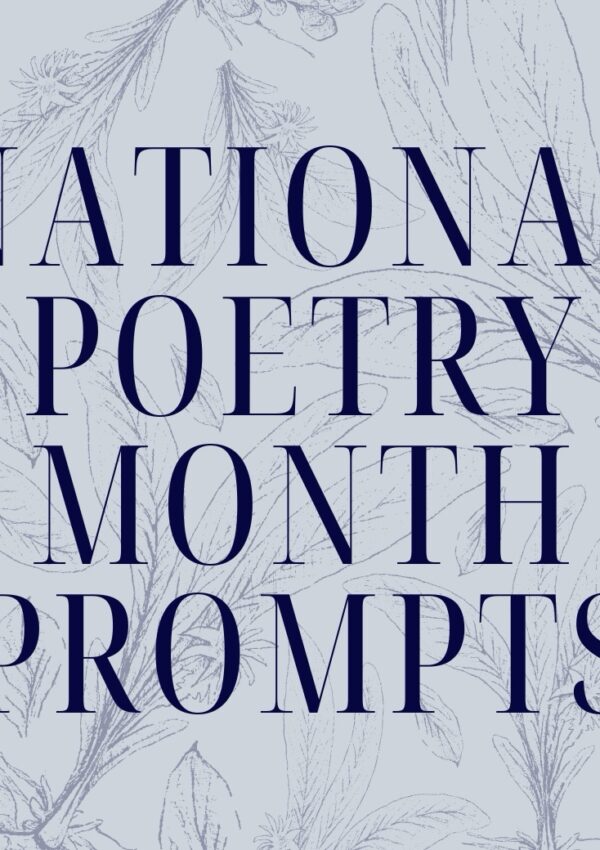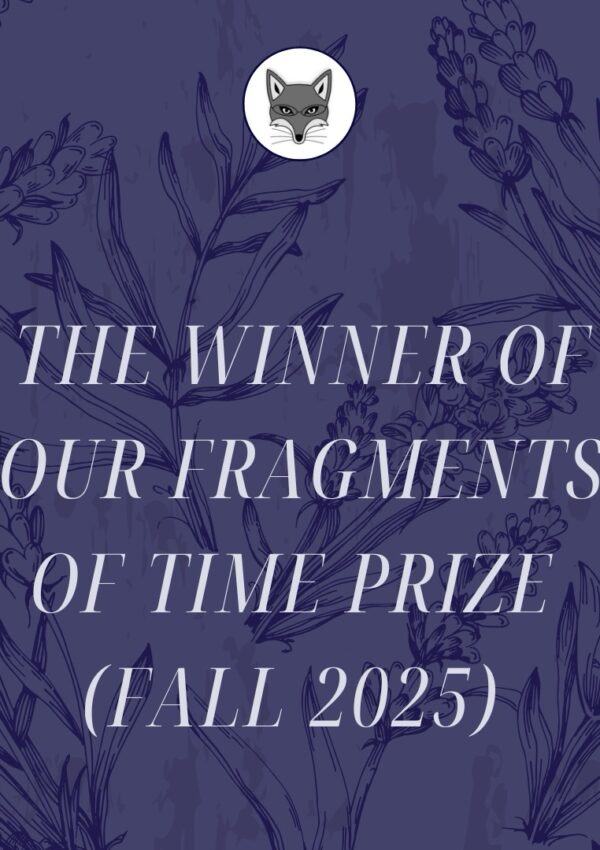In my previous blog I discussed the many mandates given writers about keeping up their writing life. I question whether these literary practices are actually absolute in nature. They are often touted with the same certainty as a college education.
Personally, I’ve found that a literary practice immensely useful during one portion of my life can become untenable in another time period. I wish to turn now to an aspect of practicing the literary arts that’s unrelated to putting words down on a screen or paper. It’s about taking words in.
Literary practices do not mean only writing. We write because we first read. We write better and better as we continue or expand our reading. All kinds of reading—or hearing—of well-crafted and considered words. Even a drama like those of Anton Chekhov, Arthur Miller, or Sam Shepard.
On the deck outside my bedroom stand a half dozen potted plants. Another eight sit on our patio of recycled bricks. When I recently decided to undertake repotting some plants and installing tomato seedlings, the act nourished my writing self. It also gave me a wonderful metaphor for this discussion. I would argue that getting away from a screen at times is essential. It allows a different part of the brain to go to work.
 I usually purchase potted plants for their bursts of colorful blooms. They’ll flower for three years or so and then no matter how well I water, their leaves turn faint green or yellow. No more blooms. A friend told me the cause—the nutrients in their soil were used up.
I usually purchase potted plants for their bursts of colorful blooms. They’ll flower for three years or so and then no matter how well I water, their leaves turn faint green or yellow. No more blooms. A friend told me the cause—the nutrients in their soil were used up.
 I tried prying a plant out of its orange-red ceramic pot—difficult because the root ball extended everywhere. In some of these beloved plants, hardly any soil remained inside. Nothing from which to uptake the nitrogen and phosphorus they desperately need. The perceptive gardener recognizes action is urgently needed.
I tried prying a plant out of its orange-red ceramic pot—difficult because the root ball extended everywhere. In some of these beloved plants, hardly any soil remained inside. Nothing from which to uptake the nitrogen and phosphorus they desperately need. The perceptive gardener recognizes action is urgently needed.
We strive to keep our body or mind healthy with good food, exercise, or friendships. Literary nutrition and friendship is needed as well so that we can thrive.
- Books and literary events.
Read, read, hear. Print is great, but when my sitting-down hours are limited, I listen to books on CD and on Audible.
Also support the literary community by attending, and perhaps bringing along others, to local literary events. Hearing authors speak, watching a play or reading some book not in the style or genre that I write in enriches my soil or adds a delightful new variety. Keep hearing or reading multiple genres. Variety is essential. And at these events I make new writer friends and keep in—maybe we exchange a story or a poem or just enjoy meeting up at another event.
Though I’m primarily a writer of fiction and poetry, I also read memoir or creative non-fiction or journalistic style articles or essays. Often non-fiction articles – ones from a source you’d never expect to influence your writing – do provide some needed vitamins. They can make one’s commonplace prose bloom. They give seeds of ideas or fill out character details or plot turns for my novel. Literary stimulation and cross-fertilization promotes unique and beautiful writing.
Some writers are planted in a collegiate setting where an abundance of literary arts flourish. They can catch a lecture from a visiting author in class or in the lunch hour. Most don’t have it that easy. Can you make this effort a part of your literary practice? For those living in rural areas, it may need to come through an occasional writing conference. It’s worth saving for.
I’ve been recalibrating my internal job description to match my literary goals. This is bringing an uptake in the literary diet: nutrients that will keep my leaves and blooms bright. Variety is becoming a standard by which I evaluate myself.
The California drought has ended, but I’m still buying succulents though I didn’t like them before. I appreciate these plants nowadays. They’re often void of flowers. Their leaves (if you can call them that) can be fleshy or thin, shaped like a spear, disc, clover, braid-like. I discovered as I’ve observed store window boxes: their colors can range from dark green to light green or even pink, red or lavender. Much good in what I previously ignored.
I complained once to my MFA professor how hard it is to read literary classics, such as Fyodor Dostoevsky, in the rush and fatigue of real life. Late at night I can’t concentrate on an abundance of details. I can’t process complex sentence structure. My advisor suggested that as I left the program that I alternate reading difficult fiction with the more popular or NY Times best sellers.
Without guilt, I read less dense book club books. I read with an eye to the still present character development alongside of excellent plot. I read Tom Clancy or Anne Perry, author of Elizabethan mysteries. I couldn’t stand a steady diet of the lightweight books—prone to being formulaic and lacking in beauty of words—but they provide a break and insight into what my culture craves. When I’ve got daytime energy, I tackle the harder ones.
- Variety of writing includes diversity in geography or culture.
Lately I’ve been reading the gorgeous prose of a novel written by a French author and translated—The Heart by Maylis de Kerangal. The sentences are long or furious waves, like the ones the teenagers in this novel ride. I gasp at the end of some sentences—so exquisite, so circuitous. More difficult language and style, I hear, is typical of more European writing than contemporary American. I read also the sparse but moving prose of Haruki Murakami, a Japanese native. I read books by Russians, by Africans, and more. Variety makes a beautiful garden.
To cap this discussion, I’ll return to that analogy of a plant too long planted in the same pot, roots filling the pot and preventing nutrients from reaching the plant. Similarly for me, old motives, beliefs and assumptions about when I write, how I write and who I write for filled up the container of this literary soul. Lately I’ve cracked the pot and broken into a new style of writing—some comic and surrealistic. Writing this essay has also been a rich experience, freed me from an outgrown container. I hope you, dear reader, will tell me of what is working well for you in your practice of the literary arts. Any re-evaluating of your own literary self?
 Carol Park’s poetry appears in the journals SLANT, Black Fox Literary Magazine, and Minerva Rising; her fiction has appeared in the anthology Irrational Fears, as well as The East Bay Review, Inigo, and The Harpoon Review. Two of her stories have been performed by actors on a Hollywood stage as part of the Pasadena Arts New Short Fiction Series. She earned her MFA from Seattle Pacific University.
Carol Park’s poetry appears in the journals SLANT, Black Fox Literary Magazine, and Minerva Rising; her fiction has appeared in the anthology Irrational Fears, as well as The East Bay Review, Inigo, and The Harpoon Review. Two of her stories have been performed by actors on a Hollywood stage as part of the Pasadena Arts New Short Fiction Series. She earned her MFA from Seattle Pacific University.
Her homes are far apart—from suburbs of San Francisco, to redwood wilderness, to cultural mazes of Japan. While teaching and befriending English learners from distant places, she’s learned how little she knows and how precious is the meeting of minds over tea.
http://carolpark.us/wp/welcome/
Carol’s poetry appears in Black Fox Issue 15.



